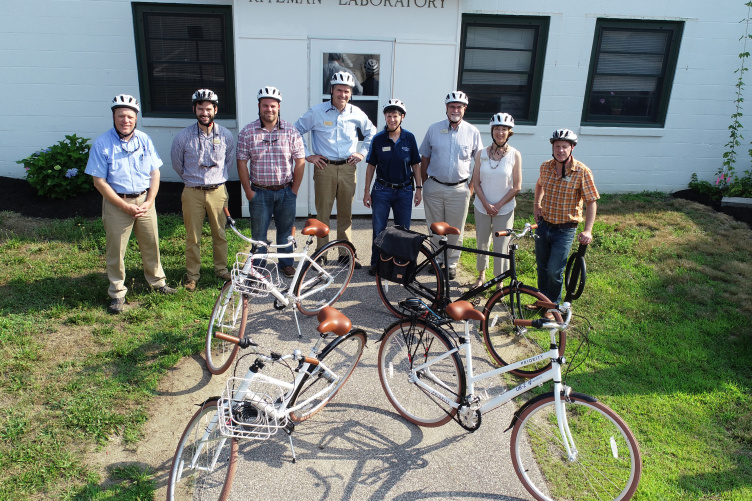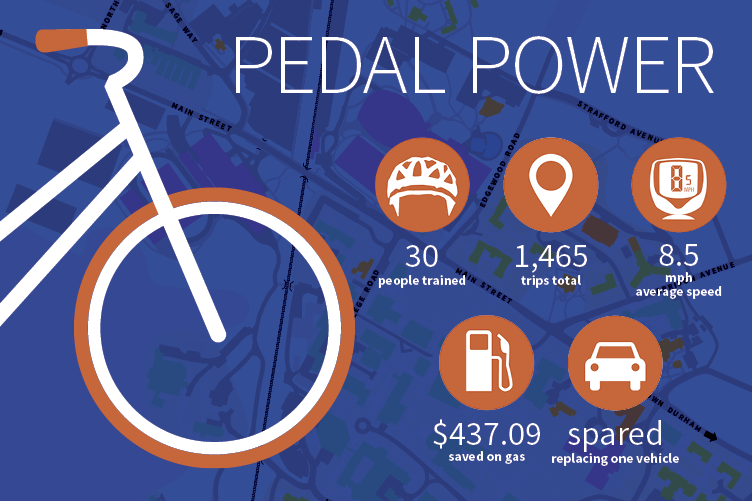
A few of the 28 staff members who signed on for the inaugural bike program pose with their bikes and safety gear. Courtesy photo
UNH facilities staff have taken the idea of “bike to work” to a whole new distance — about 600 miles, actually — and they’re hoping to inspire others across campus to do the same.
A total of about 30 staff members at the facilities department’s Ritzman Lab and Leavitt Lane locations signed on for the bike program. They replaced trips to meetings that previously would have included the use of a car with bike travel — thanks to a fleet of six bikes — and saved the department the replacement cost of a fleet vehicle.
“We wanted to reduce one motor vehicle from our pool and provide a cost savings and a more sustainable model,“ says Stephen Pesci, special projects director for facilities/campus planning. “What we found was the bikes are also great for the health and morale of our staff.”

Facilities began the pilot program back in April after gaining departmental and institutional support. Over the preceding winter, facilities staff had the plan reviewed by human resources and legal counsel and worked out the protocols for bike usage, procuring the bikes and training the 30 employees who signed on to make the move to minimizing their carbon footprint.
In the first six weeks, they logged 200 trips from Ritzman alone, which translated into 159 miles where vehicles stayed in their parking spaces and employees took the cleaner, greener bikes to appointments across campus. As the program began wrapping up this fall amidst the first threats of snow on campus, the stats were even more impressive — to the tune of more than 1,450 trips trips and 802 miles.
“Riders track their usage and each bike has an odometer, so we are pulling off real data,” Pesci says. “We’ve always been in the mindset of treating them like university vehicles and preparing to provide year-end report on metrics. Obviously, they’re not suitable for all trips or all people, but about three-quarters of our Ritzman employees took the training and use the bikes.”
Exploring Bike-Share
UNH’s Durham campus is known for its walkability. Could it become a bike-share hub as well?
“We’ve had a lot of conversation over the years about bike use at UNH Durham. Thanks to leadership investments, both the town and campus have been improving bike infrastructure. The next logical step would be to continue to expand bike use – for campus fleet and individuals,” Pesci says.
In determining whether bike-share is right for Durham, Pesci points to how the use of departmental bikes has sparked conversations. “Now those conversations are rippling out into the larger community,” he says. “I think we could be really successful at hitting a lot of fronts on this – health, safety – I see that the students I have, the interns, are aware of those white bikes, and it starts to change how they think about mobility around campus.”
With UNH’s designation as one of the country’s most sustainable campuses, bike-share may be a natural next step.
The sustainability factor was a given, and perhaps even the health and morale improvements could be expected with increased bike usage, but there were some surprises with the program as well. “We didn’t expect the additional positive impact this would have on project management,” Pesci says. “When employees are biking to a meeting, they catch something else that needs to be repaired, or they can stop and pick up a piece of trash. Our job is to repair things, and we’re catching a lot of little things you just won’t see in a car.”
The next step is to bring other campus partners on board.
“Now that we’re finishing our pilot season, we’re ready to start soliciting new departments that would like to participate, setting up their own bike pods following the protocol that we’ve been fine-tuning with USNH and HR,” Pesci says.
The bikes are purchased and owned by the sponsoring department or “pod.” Typically, the cost is about $650 for the bike, lights, racks, lock and assembly by a local bike shop with an additional $25 to provide each rider with a UNH-approved helmet. Facilities will share information on the required safety protocols and training and work with new pod managers as they begin to tailor the program to their departmental needs.
“We hope to meet with interested departments this winter to let them know what is involved and hopefully get them onboard by the spring,” Pesci says.
In the meantime, the facilities staff are looking forward to getting back on the bikes the when winter ends.
“We’re very happy with the first year of the program,” Pesci says. “I really don’t think there are any downsides.”
Interested in a departmental bike program? Email Steve Pesci at stephen.pesci@unh.edu.
-
Written By:
Jennifer Saunders | Communications and Public Affairs | jennifer.saunders@unh.edu | 603-862-3585



















































